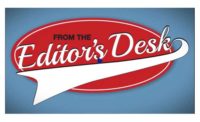Portrait of a Maverick
Eight is a lucky number for Joel Johnson who holds the record as the only outsider ever to steer the business of Hormel Foods.
Joel Johnson — steward of Austin, MN-based Hormel Foods’ business affairs as chairman of the board, president, and chief executive officer — earned his stripes in the world of food merchandising as an accomplished administrator, team coach, meat-industry advocate, and creative businessman.
His resumé charts a career path ultimately landing him in his seat of power as the head of the global meat and poultry enterprise accumulating an enviable portfolio of brands and businesses in its 113-year history. The company is known for progressive strides in processing and food safety, aggressive and innovative marketing, distribution excellence, and escalating financial returns.
Although Johnson honed his skills and talents as a consummate strategic marketer earning him proper recognition, he does not eagerly discuss past personal business successes. His credits include a 24-year-tenure with General Foods Corporation during which he shepherded the successful association of Tang with the NASA program, directed all marketing for General Foods’ large Maxwell House coffee unit, rolled out the successful General Foods International Coffee line, and led the introduction of the enormously successful Lunchables product line.
After 13 years as the man at the helm of the business that started life as the Geo. A. Hormel & Company and the first outsider to hold such a position, Johnson is preparing to pass the care of the highly regarded firm into the hands of the next generation of leaders, as he plans to retire the second half of 2005. He is comforted that the leadership position held by Hormel Foods is even more established and visible than when he began.
The power behind Hormel’s 113 years of distinction is no mystery to Johnson, who began his career in 1991 as executive vice president of sales and marketing with responsibility for the company’s four major sales and marketing groups.
“I think you have to start with the fact that Hormel Foods has an established culture,” Johnson emphasizes, recalling his first impressions as a newcomer to the firm whose name changed in 1993.
“I really have done little to change what is an effective and historically validated philosophy based upon excellence in products and a willingness to creatively support them.”
Be that as it may, Johnson — Hormel Foods’ eighth chief executive officer and the only one brought in from the outside — represents a departure from the corporate culture defining its top management recruitment philosophy. Although he declines to discuss the company’s succession plan for his retirement in an April interview, he acknowledges the existence of such a plan.
“Even though we have had a good and successful run while I’m here, I would be disappointed if we had to go outside the company again,” he says. “That’s pretty much as far as I want to get into succession talk, except to say we have an excellent management team. We give our people a lot of exposure to the board of directors who understand that our succession plan is one of their key responsibilities.”
The announcement of Johnson’s retirement plans, a new management structure, and the name of the new corporate president and board member — Jeffrey Ettinger, a 15-year Hormel Foods veteran — came the very next month in May.
Ettinger certainly will make his own mark as he assumes his leadership role over the company’s key operations — Jennie-O Turkey Store, Refrigerated Products, Grocery Products, and Specialty Products. He is not likely to disregard the power of innovation — Hormel Foods’ key marketing strength.
“Having an innovative culture [in line with founder George A. Hormel’s code to ‘innovate not imitate’] is critical,” Johnson affirms. “You have to have a culture that rewards success rather than punishes failures. I’m far more likely to punish inaction than I am to punish failure. That’s the way our organization works and the way we manage ourselves. When we succeed, we celebrate together. When we fail, we look collectively in the mirror to understand the problem; we don’t look for scapegoats.”
To be sure, there is no tolerance for maintaining the status quo at Hormel Foods, whose product mix includes new and established brands. That doesn’t mean second-guessing the timetable of a successful strategy, however.
“When something is working, you never say it could have been done five years ago,” Johnson explains. “All that does is freeze people into thinking ‘why bother’ because even if it works, the response will always be why wasn’t it done sooner.”
Take the company’s approach to enlivening appeal of mature brands, such as Dinty Moore featuring microwaveable, shelf-stable entreés in single-serve plastic bowls. It is all about adding value and consumer relevance to an existing line of popular recipes. After extensive research, Hormel’s marketing pinpointed a need to more clearly communicate the consumer offering, which led to a new look for the Dinty Moore microwave bowls line. This change has generated a sales increase of 64 percent to date.
“It came down to simplifying the packaging and making what was inside the product more conspicuous to consumers,” Johnson notes. “We took Dinty Moore out of the box by removing the over-packaging that consumers say they don’t like, saved costs, and made the product [attributes] much more evident. When you have a good product that is nonetheless stuck in the mud, it is fair to ask if anything disguises the product.”
The payoff was significant, as Johnson explains. “Even though it was a solid and well-established business, sales really jumped when we disclosed the product more clearly,” he says. “We discovered we were hiding the product from potential consumers. I thought to myself that we could have done it ten years ago. But, you don’t say that [out loud] because then improvements might never come. So you just take the successes into the future and forget the past.”
Based on public records, amassed in media reports and other publications over the years, Johnson-the-businessman is all that, to be sure. Johnson-the-man, however, is much more than his corporate and public images. Although his demeanor communicates a no-nonsense persona, he is by no means single-minded.
His three years as a solider in the U.S. Army, for example, eventually earned him the rank of captain and took him to Vietnam from which he returned home with a Bronze Star.
A recent recognition instigated by an Osceola Foods (see “Technology and teamwork”) plant employee nomination proclaimed Johnson a “patriot,” complete with an award presentation — by the Iowa Air National Guard and Army National Guard — on behalf of the U.S. Department of Defense and Employer Support of the Guard and Reserve. Qualifying employers must practice policies that support employee participation in the National Guard and Reserve. In the past three years, 32 employees returned to active military duty. Hormel operates under a company-wide policy assuring job security for employees called to active U.S. military duty. The plan also includes one week’s wages for each month of deployment.
Education and on-the-job training aside, Johnson’s thinking as a person and a professional is also shaped by external stimulants — especially literature and biographies.
“I’m not a big reader of business books,” Johnson reports. “I’d much rather stay current on what’s happening by reading [major periodicals]. I’m much more likely to read a biography on Alexander Hamilton than on Jack Welch [formerly with General Electric].” He applauds James McPherson’s Civil War account in his tome “Battle Cry of Freedom,” as the best he ever read.
Johnson is not much on watching television. He is a fan of the History Channel, however, which keeps him company as he exercises on his treadmill. He dedicates his “time and resources on education,” primarily as a member of the board of trustees for Hamilton College, his undergraduate alma mater in Clinton, NY, where he currently serves as chairman of budget and finance, the committee responsible for setting tuition and fees. “That’s never a popular chore,” he chuckles. He advises students and others to be mindful of ties to history, while also paying attention to trends concerning marketplace behavior changes.
Johnson, clearly a marketing maven, understands the rules of the game. “Money talks, but it don’t sing and dance,” he lightheartedly quotes from a Neil Diamond tune. “It’s the same with numbers and financial analysis. They’re critical to the business, but insufficient for long-term success. Your products have to sing and dance in front of the consumer. What I love about consumer marketing is that it’s a great blend of the qualitative and quantitative.”
As Johnson points out, qualitative understanding of why consumers do what they do and what it takes to satisfy them is the hardest part.
“This kind of understanding comes from experience and observation and literature and history, where you make your mind creatively fertile.”
His 17-year-old son provides a good line on what’s going on in the “real” world, reports Johnson adding that his two adult children also help to keep him up on things.
“Momentum in business is a key thing for me,” Johnson concludes. “It is so hard to get momentum, and when you have it, you sure want to keep it.”



